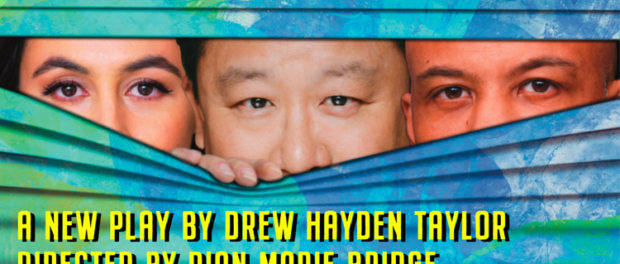Open House Misses the Sale
I’m not sure if my irony-detecting dial is set too low or if Drew Hayden Taylor’s play, Open House, directed by Dian Marie Bridge, doesn’t have enough. The play has a clever concept — three parties representing different minority groups arrive last minute to check out a suburban home’s open house. All three want to purchase it, but an incident on the street forces them to wait inside together. Each individual has somewhere else they need to be and a life story to tell, but unfortunately, they spend most of the play delivering facts about how historically oppressed their individual groups have been and froth at the mouth to claim that their group has received the worst treatment of all. The result is pedantic and heavy-handed, flattening the built-in complexity of the situation. Further, though set in Montreal and featuring a Kanienʼkehá꞉kan (Mohawk) woman, the play doesn’t reflect the cultural outlook of the city and its surroundings. The Montreal suburbs are not the Ontarian-Albertan ones. Leaving out the French Canadian experience, the influx of Haitian, Algerian, and Middle Eastern immigrants to the suburbs, and the language politics is a loud silence. As a result, the story feels inapplicably generic and a little surreal, even after accepting that selling a house is essentially a numbers game and not about choosing who the seller likes.
Drew Hayden Taylor says he just wants to make people think, not think anything in particular. He’s also said he may get cancelled for this play and that it’s only after you poke the bear that you learn how fast you can run. While he may not be open to describing his specific agenda, intriguing concepts are embedded in the framing story. In thinking of the house for sale as a metaphor for contemporary Canada and the Canadian (or American) dream, how does being a member of a specific minority group reflect one’s access to and desire for that dream? When Tammy, a Kanien’kehá:kan lesbian woman, points out the discomfort she feels towards buying a house on land that was stolen from indigenous people, it is clear Taylor picks up on this dissonance. But he doesn’t do the same for the others. Does the historic practice of redlining and housing segregation for specific minority groups impact the desire to own a home in the Montreal suburbs? Is owning a suburban home a symbol, and if so, of what? Selling out? Making it? A cultural shift? Further, the house was owned by a white couple who had the power to decide who would purchase it. Instead of using this fact to explore the complex concept of white adjacency, the character mainly serves as a straw man for the ignorance and stupidity of the majority whites.
Another missed opportunity in the play is how the production handles identification with a group versus respect for the individual. Eve, despite being completely ignorant about non-white experiences, becomes the most sympathetic character when the others collectively attack her over her dream to be an actress. The suggestion seems to be that only an over-privileged caucasian would dare allow herself the luxury of pursuing a “frivolous” dream. Yet having a dream is hardly limited to one race or ethnicity. There’s an irony in watching actors of different backgrounds successfully working, presumably fulfilling their dreams in a competitive field, ridicule a character for wanting to be an actress. The humour doesn’t come through, just hostility. The attack on the individual implies that groupthink leads to a lack of compassion for others.
There are things to commend in the show. One is the excellent performances by the actors, all of whom are familiar and beloved. Rebecca Gibian brings warmth to Eve, the clued-out real estate agent who remains patient with her guests. Jovanni Sy gives 110% as the recently divorced, free-wheeling Ned. The scene when he coaches the co-dependent Adrian (Christian Paul) through a phone call is one of the play’s best moments. I also appreciate the inclusion of an inter-racial lesbian pregnant couple — one of the few things that strikes me as an especially Montreal feature — and the actors (Kerrin-Lee Whyte and Carra Rebecca) capture the way a tight, loving couple can internally dissent, yet fight against external forces as a unit. Finally, the set captures the ambiance of a suburban home with just a few details in an interesting studio space. Kudos to that.
Overall, I find it hard to diagnose why this show leaves me cold with such an excellent cast and a well-established director (Dian Marie Bridge) known for directing politically charged works examining identity. But whether done ironically or not, recounting statistical and pedantic facts in dialogue just doesn’t make for watchable theatre. A little more show and a little less tell might go a long way. The underlying messaging is muddled and in consequence, everyone is unlikable and unsympathetic.
Open House continues until April 28 at the somewhat hard to locate but rather awesome Factory Studios (2000 Rue Notre Dame E, Montréal, QC H2K 2N3, Closest Metro Station Papineau). Follow the directions given. Tickets HERE.






